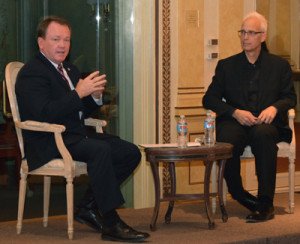SWLAW Blog | Events

November 25, 2015
LA County Sheriff Jim McDonnell Shares His Views on His First Year in Office
On November 23, Southwestern’s Criminal Law Society hosted a special program featuring an interview with Los Angeles County Sheriff Jim McDonnell. In a wide ranging discussion moderated by Professor John Heilman, Sheriff McDonnell talked about the enormous challenges that the nation’s largest sheriff’s department and second largest policing agency faces, as well as the changes he has worked to implement since being sworn in last year. The conversation covered the recent rise in crime, officer involved shootings, interaction with homeless and mentally ill residents, counterterrorism and sex trafficking, among other timely issues.
Sheriff McDonnell, who served in the Los Angeles Police Department for 29 years and spent five years as Police Chief of the Long Beach Police Department, had not considered pursuing the office of LA County Sheriff until he was asked to serve on the Citizens’ Commission on Jail Violence, a blue ribbon group created by the County Board of Supervisors to investigate the validity and causes of allegations of excessive force within the LA Sheriff’s Department Custody Division. He had worked closely with the department for three decades and felt it needed strong leadership, but he was still hesitant about the prospect of running for an elected office.
“I’d never run for anything before, not even student council,” he said. “I had never fundraised. A cop asking people for money does not feel right.” But he was able to raise $2 million for his campaign and won the election -- the first outside candidate to become LA County Sheriff in over 100 years.
“I had worked alongside the Sheriff’s office for 30 years and thought I knew everything about it,” he said. But the sheer enormity of the county’s 4,083 square miles and profoundly diverse population of 11 million people that the department serves is overwhelming. Even with a budget of $3.2 billion, the department is very lean, deploying only one deputy per squad car (as opposed to two in many police agencies) to help stretch personnel resources. There are 18,000 employees and 9,100 officers in the department.
When asked about how the department is coping with the threat of terrorism in light of the recent attacks in Paris and other parts of the world, Sheriff McDonnell said collecting information on possible threats is easy, but the real challenge lies within “triaging it and deciding what’s credible.”
He pointed out that the LA County Sheriff’s Department is the model of the nation in terms of its collaboration with local, state and federal agencies. Attorney General Eric Holder met with Sheriff McDonnell to learn more about this sophisticated system of interaction.
In response to a question about the recent highly publicized spate of shootings of unarmed individuals and what the Sheriff’s Department is doing about it, Sheriff McDonnell said that the department looks at all incidents happening nationally and assesses them. With the rise of social media, often these cases are publicized before police departments are allowed to comment on them. He acknowledged that unjust situations occur but said that it’s, “a fraction of one percent of what goes on.” He also said all the negative press deters people from considering a career in law enforcement.
When asked about the many difficulties the LA County Sheriff’s Department faced in the past, Sheriff McDonnell said that the biggest problems were in 2011, and that now there is almost a whole new slate of personnel managing the department. He also said there are many different positions for attorneys within the Sheriff’s Department, including two newly created positions for in-house constitutional policy advisors.
During a brief Q & A with audience members that followed, Sheriff McDonnell was asked about the recently formed Los Angeles Regional Human Trafficking Task Force. He said that human trafficking is as much a local problem as it is an international issue, with many of the victims in the Los Angeles area coming from the foster care system and who are therefore vulnerable prey for pimps who treat them like property. Funding has been procured to hire more detectives who will head a coalition of representatives from throughout LA County to develop more effective methods of stopping the pimps as well as those who solicit these crimes. They also no longer use the terms “child prostitute” and “underage prostitution” in recognition that these are victims of rape who are too young to consent to sex.
When asked about his top three priorities for 2016, Sheriff McDonnell said that first and foremost is general reduction of the crime rate, which has increased significantly since the beginning of 2015 after a number of years of decline. He pointed to the recent change in California law reducing certain drug and property crimes to misdemeanors instead of felonies, which he feels has taken away the incentive for addicts to seek treatment and in turn resulted in a rise in recidivism. The other two priorities are counter terrorism and building officer-community relations to restore the public’s trust.
“We have to be very flexible,” Sheriff McDonnell said. “People only call us on the worst day of their lives. My goal is to hold people [in the Sheriff’s Department] accountable for what they do. I want to reward those who do well; own it when we make mistakes and work to rectify them… We’re accountable to the public at the end of the day.”
To view photos from this event, visit Southwestern's Flickr page.